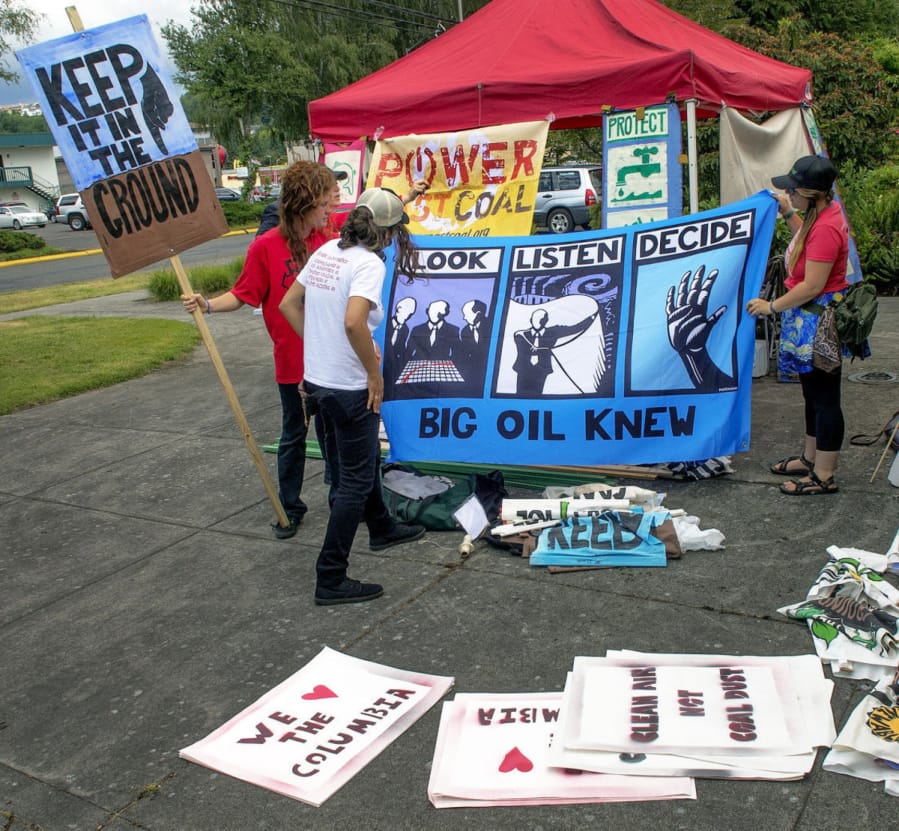LONGVIEW — Bearing signs, planting flags and dressed in red or blue, thousands of people descended on the Cowlitz Expo Center on Tuesday to testify at the first public hearing on the draft environmental study of Longview’s proposed coal export dock.
The Expo Center was packed as impassioned testimony ran from 1 to 9 p.m., but the audience was polite, waving signs and refraining from catcalls and other rudeness. Many opponents of the Millennium Bulk Terminals proposal wore red, while those supporting the facility wore blue. As the hearings began, the red shirts somewhat outnumbered the blue.
The $680 million Millennium terminal would ship 44 million tons of Rocky Mountain coal to Asia annually from the old Reynolds Metals Co. plant west of Longview. At its height, the project would see eight trains per day, each carrying 125 cars full of coal, travel through the Columbia River Gorge and Vancouver, with many if not all of those trains making a return trip through Clark County.
The project has taken on aspects of an environmental holy war, with opponents predicting the project will blanket Longview and communities along the rail lines with dust, cause congestion at rail crossings and worsen global climate change when the coal is burned in Asia.
Supporters, pointing to the 3,000-page draft environmental impact statement released late in April, say coal dust won’t be troublesome and that the region needs the terminal’s 135 direct jobs, $16 million annual payroll, millions of dollars in tax revenue and other economic benefits, including thousands of construction jobs.
On Tuesday, red signs blasting the project studded the lawn outside the expo center. Some read “Fossil Free” with a bright red X. Others read “Keep it in the ground.” Nearby, a line of blue flags read “Washington Jobs,” and pro-Millennium signs were placed in between anti-coal posts.
About 2,000 people were expected at the hearing, and environmental groups opposing the terminal were said to be busing people in from outside the county.
Eastern Montana ranch owner Brad Sauer, 56, was one of those to arrive early. Dressed in a red, button-down shirt and wide-brimmed hat, Sauer said the proposed export dock will encourage mining and degrade water quality in his region near Billings
“My big message is it’ll negatively affect our ground water,” he told a reporter, emphasizing that bad water quality could lead to poor health and create problems at his ranch. “Additional mining in our area is not good.”
Sauer said he felt the environmental review was well done but failed to adequately assess the impacts to states outside Washington.
Another early bird to the hearings, Richie Allison, a 42-year-old Millennium employee from Castle Rock, said Millennium has “done a lot for the local community, and it’s been nothing but positive. ”
The slogan “Building it Right” was printed on periwinkle blue T-shirts and dark blue signs surrounding Millennium’s center at the “Floral Building.”
In the lawn nearby, 260 green Washington flags were staked into the ground, each representing 10 indirect and direct jobs the coal dock would create. A sign depicting a happy family with the slogan, “Washington Jobs” and “Washington Families,” marked the entrance of the rally spot.
People had to sign in and were chosen by lottery to testify. Each speaker had two minutes to deliver comments, but the vast majority of attendees would not get the opportunity to speak despite the seven hours set aside for testimony.
One of the first to testify was Andy Harris of Multnomah County, Ore., who said the economic benefits are not worth the health risks he said the terminal could pose.
“What is the economic impact of emergency room visits,” Harris asked, “and who will pay for these costs?”
Instead of clapping or hollering, the audience waved red or blue signs to show their support for what each speaker said.
Dave Gillihan, 61, of Longview said the area needs the jobs Millennium would create.
“Your pot shops and hamburger joints do not provide great benefits,” Gillihan said.
State Rep. Brandon Vick, R-Felida, who represents the 18th District in north Clark County, said he was glad the environmental review concluded that coal dust from trains will not exceed safe levels.
“I live a stone throw away from the railroad tracks,” said Vick, 31. “That’s why I appreciate seeing (that) air-quality standards are not going to be exceeded.”
Despite the obvious effort in both camps to get out as many supporters as possible, the environmental review process is not a popularity contest. From a strictly legal point of view, the hearings are meant to highlight flaws, omissions and strengths of the environmental study that has been in progress for years. Clearly, though, both sides hoped to impress decision-makers with strong shows of force. The meeting was run by Cowlitz County, the state Department of Ecology and ICF International, a consultant that helped write the environmental study.
Public comment on the draft environmental impact statement will be taken through June 13. Comments will be incorporated into the final impact statement and help state agencies decide whether to issue permits.
Comments on the project can be submitted through www.millenniumbulkeiswa.gov or by mail to Millennium Bulk Terminals EIS, c/o ICF International, 710 Second Ave., Suite 550, Seattle, WA 98104.
The draft environmental impact statement can be found in full at www.millenniumbulkeiswa.gov/sepa-draft-eis.html.



